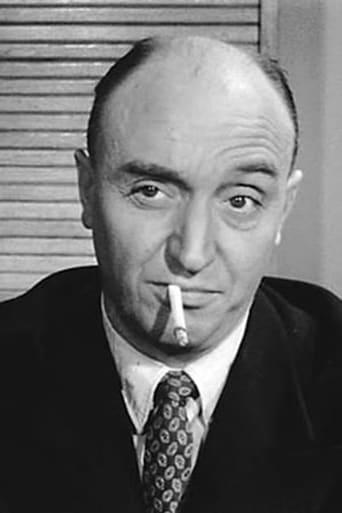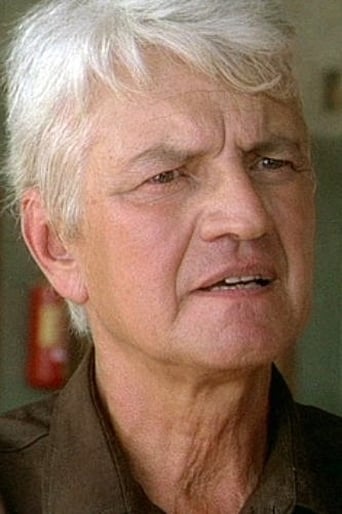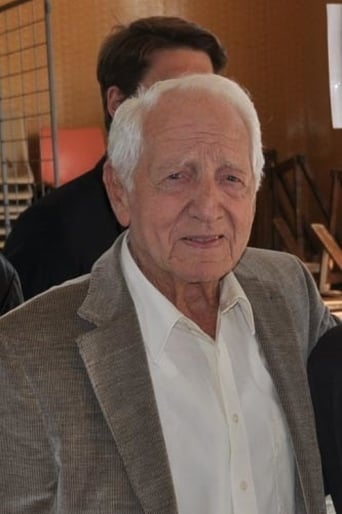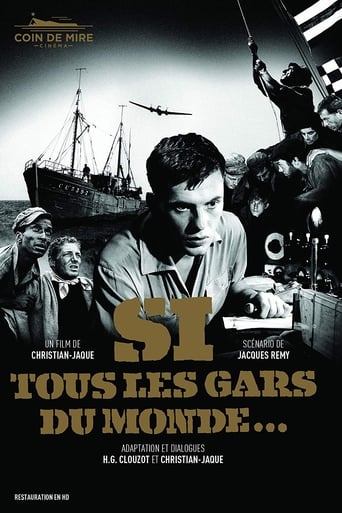
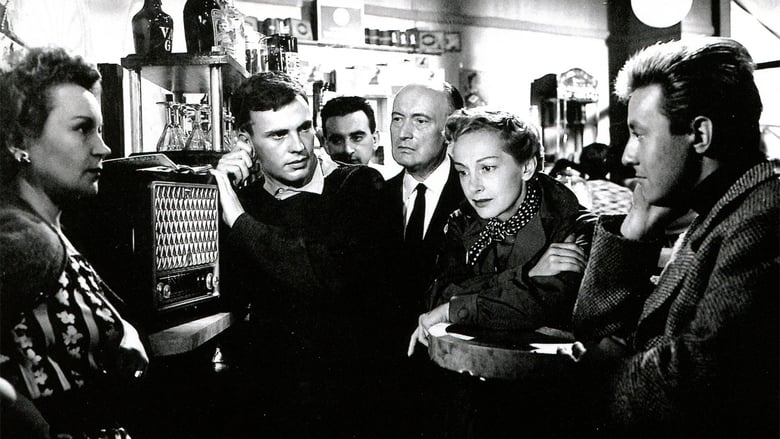
If All the Guys in the World... (1956)
A distress call from a trawler leads various people to come to the crew's aid.
Watch Trailer
Cast


Reviews
Sick Product of a Sick System
I think this is a new genre that they're all sort of working their way through it and haven't got all the kinks worked out yet but it's a genre that works for me.
Like the great film, it's made with a great deal of visible affection both in front of and behind the camera.
By the time the dramatic fireworks start popping off, each one feels earned.
On a small fishing boat in the North Sea the sailors fall sick one after the other. The boat is far from the coasts and the radio is broken. The skipper has the idea of using ham frequencies to send the alert. A radio amateur from the colonial administration in Togo gets the message. He calls the local doctor who diagnoses food poisoning: all fishermen had eaten homemade ham. All by Mahomed, faithful to the Halal code. A vaccine should be sent to them, as fast as possible, otherwise death can occur. It is a matter of hours.Togo sends a call towards Paris, to reach a friend of the physician. The alert is received by a young radio amateur (played by a very young Jean-Louis Trintignant). He goes to the address of the doctor's friend, to find out that the man died three months ago. The widow refuses to listen to him. The young guy insists and succeeds to persuade the widow. It is a great scene, as the youngster pleads for the guys trapped by sickness on North Sea while the widow starts to realize that she still has responsibilities for this life that goes on, beyond her loss. They buy the vaccine and run to the airport. The vaccine is sent by air to Berlin, to be forwarded there to a Danish plane, in charge of finding the boat and parachuting the parcel.So someone in Germany should be alerted: the man who gets the ham signal is a world veteran who is blind. He succeeds in turn to call an American pilot in West Berlin. Only the parcel needs to be taken from East Berlin and we are in the first middle of fifties, at the peak of Cold War. So the American enters the East Berlin, is caught by a Soviet patrol ... he succeeds in explaining what the matter is to the young Soviet officer who interrogates him. So the medicine is given to the Danish airplane and finally arrives in time to the boat.I saw the movie in the first mid of the sixties, and read then the book it was based upon. Odd is that I didn't find any reference to the book on the web. It happens.The whole story seems at first to be far too pathetic to be taken seriously, but you should see the movie. It communicates you a sense of generosity and solidarity that is irresistible. Different little universes, completely remote each other in any sense, bored clerks in the colonial administration in Togo, far from France, a widow in Paris for whom nothing matters anymore, a blind veteran of war finding solace in front of the ham radio, American and Soviet soldiers opposed one another, a crew of fishermen fighting for their life far away in the sea, and each of these universes is crossed by petty conflicts, women sick of their spouses, endemic lack of money, for medicines, for phone calls, for anything, stupid mistrust born from devilish propaganda demonizing the other side, stupid racist beliefs that the Muslim is always the suspect ... and despite all this, nothing matters any more, the Cold War mistrust, the personal dramas and tragedies, the cultural differences, nothing, we all are "des gars" and can really be together.
Please. Does anybody have Spanish subtitles for this movie? I'll appreciate it. I've seen the movie and i like it, but I can hardly understand French. Could be useful for me an English subtitles too. Anyway, for the people who have had some experience in radio ham the film will like very much, specially for Radio Amateurs who begin 30 o more years ago. The different places where the radio amateurs are, bring you an interesting feeling. The radio in Togo has an special meaning, it's the link with the world, and with the blind man has another meaning, is the link with life and hope. I enjoyed this film very much even though the language is hard for me. I'll be waiting for somebody who could give me Spanish or English translation. Thank you.
..It is not hard to do.As the last link on the chain is Norwegian,I dedicate this comment to my good old pal from Norway,Oystein.Inspired by a Paul Fort poem (1912),"Si Tous Les Gars du Monde" is an hymn to brotherhood ,solidarity and responsibility.It sums up Christian-Jaque's philosophy whose best works ("les Disparus de Saint Agil" " d'Hommes à Hommes" ) display a deep belief in the goodness and the dignity of men.There are pessimistic works in his filmography ("Un Revenant" "Boule de Suif" and the unfairly overlooked "le Repas des Fauves" ) but you'll notice that those are stories where people ,either are unable to all stand together or treat one of their fellow men like dirt.The precedent user was right when he wrote that Lennon's "Imagine" is an exact equivalent of Christian-Jaque's work.Twelve fishermen were intoxicated by food (no,eleven,cause there's a Muslim among them and he did not have ham).Then begins a race against the clock cause they are at sea,far from the Norwegian coasts.If they do not get serum by eight,they'll all die.It's 1956,and it is not that much easy to take the precious vials.But "Si Tous les Gars du Monde "...lend their hand,then everything's possible.People from Africa,from France,from Germany ,from Norway ,become all the links on the chain,a chain of love and of altruism..French critics objected that C.J ; did not always avoid pathos.But he made all his "links" endearable.The young radio amateur (Jean Louis Trintignan) now sees his hobby differently .The late doctor's wife who has lost all her illusions,after refusing to be part of the game for a short while,knows now that her life is still useful.The German blind man (ten years after WW2) was a symbol of the soon-to -come France/Germany new friendship before De Gaulle and Adenauer made it a reality.And on the trawler,there's a racist man who finally understands that a man's heart does not depend on the color of his skin:the scene when Mohammed dives into the icy waters of the Norwegian sea is the most moving scene in a movie which will you drive you to tears...When the trawler docks in a harbor in Brittany (Concarneau),they hoist the French flag,but you do not hear La Marseillaise!You do not hear "Imagine" either of course but the music Georges Van Parys wrote ,an hymn to fraternity.It became a good campfire song in the years which followed."Si tous les gars du monde/Décidaient d'être copains..." Should all the guys in the world decide to become pals...Most amazing thing: HG Clouzot was one of the script writers!It's a far cry from his black stories.Maybe he ,too,had to believe in finer feelings and a better world.
This moving film is about people helping people, in this case using the radio. The story starts when a fishing boat on the North Sea has all its crew getting ill with an unknown disease. Through a radio amateur a message is sent and received by someone in Togo who gets in contact with the local doctor who gets to the conclusion that they had food poisoning caused by ham. The only person on the boat who is well is Mohamed who did not eat the spoiled ham because of his religion. A message is sent to Paris where they find the antidote, but the problem now is sending it to the boat. The only way is to parachute it. There is a cooperation between a German, an American, a Polish air hostess, the Russian Air Force, and a Danish plane to get the medicine to the boat. A film not to be missed, it takes its title from a poem (song?) by Paul Fort that says that if all the men and women in the world would hold hands, happiness would be for tomorrow. John Lennon had the same idea in his song Imagine.


